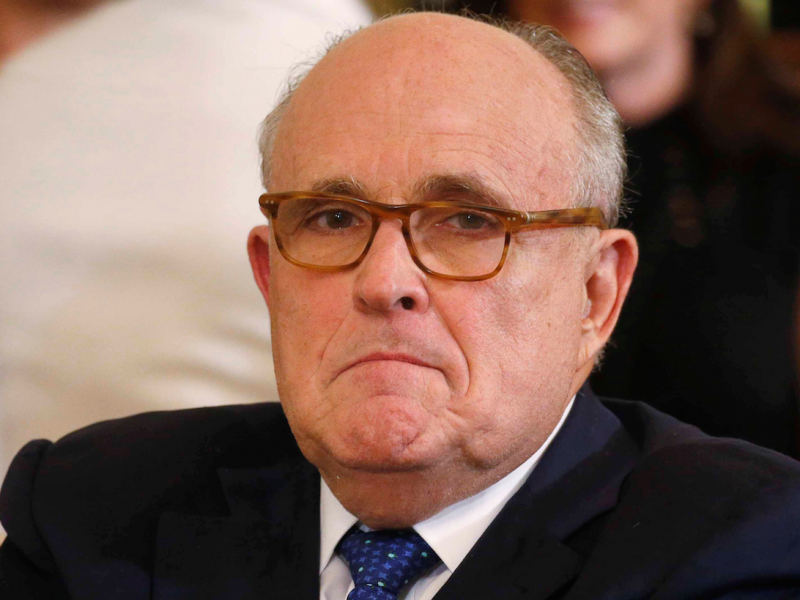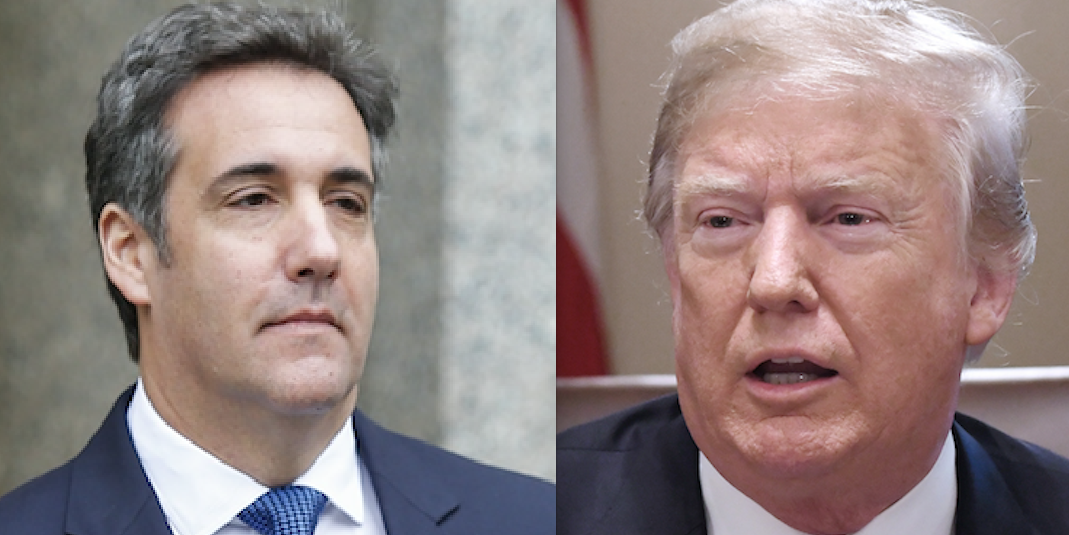- President Donald Trump’s lawyers waived privilege over 12 audio recordings seized by the FBI from his former longtime lawyer Michael Cohen.
- One source with knowledge of the Trump team’s decision making said the lawyers did so because they claim Cohen was discussing the tapes with others, such as Michael Avenatti, the attorney for porn star Stormy Daniels.
- In a tweet, Cohen’s attorney Lanny Davis denied that Cohen discussed any recordings with Avenatti.
Eyebrows were raised over the weekend after multiple outlets reported that President Donald Trump’s lawyers waived privilege claims over a bombshell tape seized by the FBI from his former longtime attorney Michael Cohen that contained a conversation between the two about payments made to ex-Playboy model Karen McDougal.
That meant the tape could be handed over to the federal investigators probing Cohen for a slew of potential crimes.
Even more surprising was the news that broke on Monday. Special master Barbara Jones wrote in a court filing to US District Judge Kimba Wood that privilege claims were withdrawn over 12 audio tapes seized from Cohen – an action that could’ve been taken by either Cohen, Trump, or the Trump Organization. It’s unclear who appears on those 12 tapes, or if the tape revealed on Friday was among them.
As special master, Jones is tasked with overseeing the document review for privilege designations in the ongoing Cohen investigation taking place in the Southern District of New York. Because the parties released their privilege claims over the tapes, they too have been turned over to federal investigators probing Cohen, she wrote.
A person with knowledge of the Trump team's decision making on the matter told Business Insider the president's attorneys waived their privilege claims over all of the tapes because they claim Cohen had been discussing them with others, such as Michael Avenatti, the attorney for porn star Stormy Daniels, who is suing the president and Cohen.
The person said Trump's legal team didn't know "exactly what Cohen" has told others, but added that the lawyers "have the tapes" and "heard them all." Trump's attorneys "don't have any problem with anybody listening to them," the source said, adding that the remaining tapes disclosed Monday contain conversations between Cohen and a third party about Trump, not direct discussions between Trump and Cohen.
Trump's lawyers waived privilege so they could speak freely about the tapes, now that they claim Cohen is separately speaking about them, the person said. The person said waiving the privilege was "inevitable" and that they "didn't know how it was coming out" but "knew Cohen was the source."
Avenatti's Sunday comments on ABC's "This Week" further confirmed the Trump team's thoughts, the person said.
Avenatti, who crossed paths with Cohen at a Manhattan restaurant last week, said Sunday that he has "continued to have a dialogue" with Cohen. Avenatti added he believes Cohen will "assist us in our search for the truth."
Of note, Avenatti first mentioned the existence of such tapes in May.
On that ABC News panel, Harvard law professor Alan Dershowitz questioned why Avenatti had knowledge of additional Cohen recordings. Dershowitz said that if additional tapes existed, they would be protected by attorney-client privilege and that Cohen is "not allowed to cooperate with anybody if there's lawyer-client privileged material."
"All of the information that the FBI seized, that's not under lock and key," Avenatti responded. "The only way that it would be improper for me to have it is if I got it from the FBI or somebody in law enforcement. There's a host of other ways I could have obtained that information. ... I could have received it from Michael Cohen, I could have received it from Michael Cohen's counsel, I could have received it from others."
That comment led to a tweet from Lanny Davis, Cohen's attorney, denying that his client provided Avenatti with information about the recordings.
Avenatti declined comment to Business Insider. Davis and Dershowitz did not immediately respond to requests for comment from Business Insider.
The first tape
The back-and-forth followed the revelation of one such recording on Friday when The New York Times reported that Cohen recorded a conversation with Trump just two months ahead of the 2016 election in which they discussed payments to McDougal.
The National Enquirer purchased McDougal's story of an alleged affair with Trump for $150,000 in August 2016. But the outlet never published the piece. That practice is known as "catch and kill," and it effectively silenced McDougal's allegations. Federal investigators had sought documents in the Cohen raids related to that payment and similar payments to other women.
David Pecker, the head of American Media Inc., which publishes the National Enquirer, is a longtime friend of both Trump and Cohen. Citing a person familiar with the recording, The Washington Post reported Friday that Cohen and Trump discussed a plan to purchase the rights to McDougal's story from Pecker's company for about $150,000.

Trump's personal attorney, Rudy Giuliani, confirmed to The Times that Trump discussed payments to McDougal with Cohen, but he said that ultimately no payment was made. Giuliani said the recording was less than two minutes long, and that there was no indication based on it that Trump knew of the payment to American Media Inc. beforehand.
Giuliani said Trump told Cohen that if he did pay McDougal, it should be in the form of a check instead of cash so that it could be properly recorded, The Times reported.
Meanwhile, a source told CNBC that waiving the privilege claim over that tape provided Giuliani the ability to release "his version of the tape's contents." Giuliani confirmed to NBC News that Trump's team waived the privilege protections over that recording.
Other reporting has differed from Giuliani's description of the tape. CNN reported, citing a source familiar with the recording, that when Trump was informed about the tape he said he couldn't "believe Michael would do this to me."
In a Friday evening tweet, Davis said the recording "will not hurt" Cohen once it is heard.
Another explanation for why Trump's team waived their privilege claims
Attorneys said there were reasons beyond what those close to Trump's legal team provided as rationale for waiving the privilege.
For instance, as criminal defense attorney Ken White explained to Business Insider, if Trump's team asserts privilege over the tape, the government can try to overcome that privilege by asserting what is known as the "crime/fraud exception" to privilege claims. Simply put, a client's communication to an attorney cannot be privileged if the communication was made with the intention of committing or covering up a crime or fraud.
"A public battle over the exception - a public assertion that Trump consulted Cohen to commit fraud or crime - would be terrible publicity, and a judicial finding would be worse," White said. "So maybe Trump withdrew the attorney-client privilege assertion to avoid that fight."
"For now the tape isn't public," White continued. "It's more low-key just to let the US attorney's office have it. That implies that them getting it is less bad than the public debate over it would be - so it may not be very exciting."
Roland Riopelle, a partner at Sercarz & Riopelle who was formerly a federal prosecutor with the US Attorney's Office for the Southern District of New York, told Business Insider that he believes the Trump team knew this tape would fall within the crime/fraud exception.
"To my mind, the confirming proof of all this is the fact that Trump is not releasing the tape itself. If the tape was so darn good for him, why wouldn't he let the media have it?" Riopelle said. "Instead, he is describing it and spinning it so that he controls the narrative."

